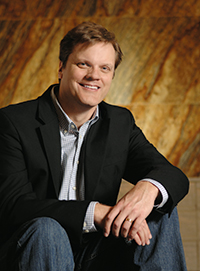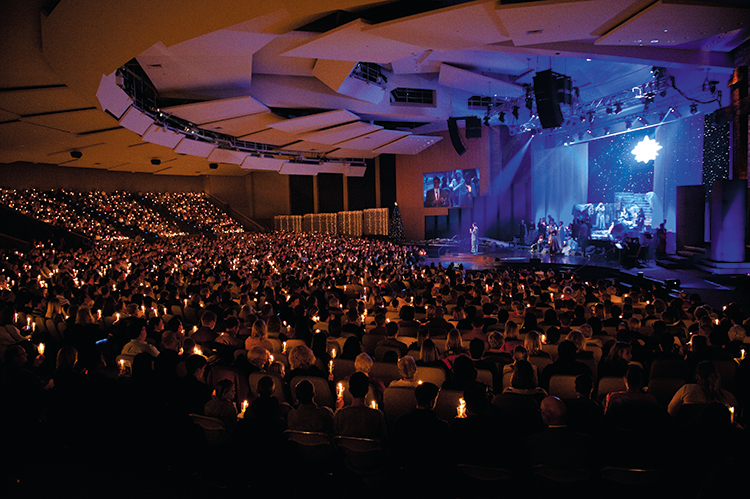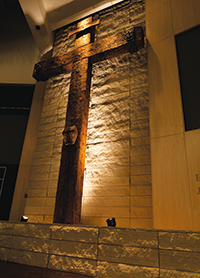Written by Ken Fuson
Super Bowl Sunday. Time for church.
But not just any church. This is Lutheran Church of Hope in West Des Moines, the largest church in Iowa and one of the largest and fastest-growing churches in the country.
All things may be possible through God, but try finding a parking space at 10 a.m. Five weekend services are required to accommodate the 8,700 members who attend regularly.
“Welcome to Hope,” a smiling woman says at the door.
Being cynical here is easy, like shooting fish and loaves in a barrel. Look at the line at Cafè Hope, where the faithful can buy a chai latte for $3 and purchase a Hope sweatshirt for $36. You can take your beverage into the gorgeous Worship Center, where nearly all the 2,596 seats—more than twice as many as in Hoyt Sherman Place—offer a cup holder. And those seats! Movie-theater comfy.

Housholder moved to Des Moines in 1993 to lead Lutheran Church of Hope, now Iowa’s largest church. Photo by Duane Tinkey.
As you sip your chai, a band plays contemporary Christian music. Five enormous screens project what’s happening on stage—er, the altar—which is flanked by a waterfall on one side and a 2 1/2-story wooden cross on the other.
Here comes the minister, the Rev. Mike Housholder, who’s 6-foot-5 and has the boyish appearance of someone a decade younger than his 46 years. He talks about a Super Bowl commercial that was rejected for inviting viewers to look up John 3:16—For God so loved the world…—and you think, here we go, another rant about how those poor Christians just can’t catch a break.
But then he fools you.
“Maybe the problem is us,” he says. “Maybe we need to be better Christians. Because if we were better Christians, they wouldn’t be so afraid of us.”
Your other assumptions prove just as false. You learn that every cent of the revenues produced by selling all those lattes and sweatshirts supports missions. In fact, 25 cents of every dollar given to the church last year was devoted to missions outside the church, a ratio leaders plan to raise to 50-50.
You learn that today’s “Souper” Bowl Food Drive, which sounded cute when you first heard it, will generate donations of 120,000 pounds of food—60 tons—that will be distributed to 36 food pantries in Central Iowa.
That waterfall? It’s part of the baptismal font, and it was donated anonymously. The cross? It was handcrafted by a member who felt moved to build it. No church officer requested those gifts; they just happened.
Eighteen years ago, this same church held its Sunday worship services in an office suite with a congregation of 12. Hymns were played on an electric keyboard. Last December, nearly 20,000 people attended one of the Christmas programs, where they heard Housholder tell them: “The goal of Lutheran Church of Hope is not to point you to the light of Lutheran Church of Hope. The goal of Lutheran Church of Hope is to point you to the light that lasts.”
And the cynic wonders: What’s going on here?
Mike Housholder never wanted a church this big. Five hundred members, that was his goal back in 1993, when he was knocking on neighborhood doors and explaining why his West Des Moines church met in an Urbandale office building.
He didn’t want to knock on those doors, either. A self-described “introvert who likes people,” he was paralyzed by the prospect. But his superiors in the Evangelical Lutheran Church in America (ELCA) said he needed to recruit new members. So he wore out two pairs of shoes. “My prayer life accelerated intensely every time I went out there,” he recalls.
One of the doors he knocked on belonged to Caroline Boehnke-Becker, an obstetrician-gynecologist who eventually became a Hope minister. Another door belonged to Cal Hultman, a former Iowa Senate majority leader. He accepted Housholder’s invitation to worship and has been a Hope member since.
“He’s one of the most outstanding men I’ve ever known,” Hultman says. “He’s a person of principle, of conviction, of understanding.”
Housholder will cringe when he reads that. Although he understands and accepts the interest in Hope’s growth, he was reluctant to be interviewed.
“It’s not about me,” he says repeatedly. “It’s a God thing.
“I have such a distaste for churches that put the focus on a human being or a pastor or a leader,” he explains. “The focus of a church has to be Jesus Christ, or we’re pointing people to a person who doesn’t have the power to give them what they need. People need the real deal. I’m fully aware of why this church has grown, and it’s got everything to do with God.”
Sally Housholder laughs, saying she and her husband still refer to themselves as “just a couple of Chicago kids who don’t know what they’re doing.”
They met in a high school youth group. Mike Housholder’s father, Tom, was the church’s minister. He moved his family to churches in three states before settling in Chicago. All three of his sons eventually became ministers.
“I would love someday to think I could be as good a preacher as my dad,” Housholder says.
Even in high school, Sally says, Housholder would try to recruit people to church, inviting members of his basketball team to youth group. But it was while serving in the campus ministry at Concordia College in Moorhead, Minn., that Housholder decided he couldn’t imagine doing anything else. After college, he graduated from Luther Seminary in St. Paul.
Housholder married Sally, his high school sweetheart, and accepted his first assignment at a rural church in Huxley. “They were so patient with me,” he says. He was so nervous officiating at his first wedding, for a couple in their 50s, that he switched their last names. “You want to try that again?” the bemused groom asked him.
Housholder loved the small church, and was reluctant to leave. He often refers to Huxley when explaining that there should be room for churches of all sizes. “Bigger is not better,” he says. “Smaller is not better. Better is better.”
But the ELCA had a problem: a church in an affluent, fast-growing community that was not growing. So ELCA leaders asked Housholder to move. For a goodbye gift, the Huxley congregation gave him a print of Noah’s Ark. He arrived in West Des Moines the same week that Iowa received some of the worst flooding in its history. It was not a good sign.
His first month at Hope, the average attendance was 12. “You could bring a plate of cookies and feed the church back then,” said Mike Horstmann, who now serves on Hope’s care ministry team.
But the door-knocking apparently worked, because Hope’s congregation grew to 200 and began meeting in the Living History Farms chapel. One Sunday, Housholder forgot the legal pad that contained his handwritten sermon. He was terrified of public speaking—still is, actually—and asked Sally to retrieve it.
“You can do it,” she said. “It’s in your heart.”
He thought it was his worst sermon. She thought it was his best. Out went the legal pads. Housholder still writes his sermons and memorizes the outline, but the only thing he carries with him on the altar is his Bible.
Like the best preachers, Housholder’s sermons contain a little bit of everything—humor, metaphor, personal anecdotes, emotion, passion. He talks about his children: Jon, 2e0, Danny, 18, and Kristy, 16. He will use anything—a scene from “Seinfeld,” a clip from “Talladega Nights,” interviews with Super Bowl participants—to illustrate a point. He can joke about his beloved Chicago Bears one minute and in the next speak movingly about how a grieving mother’s faith could remain unshaken despite losing her 21-year-old son to cancer.
“We know how the story ends,” Housholder says, one of his favorite refrains. “We know the story ends well for us in heaven because of God’s grace…. It’s a pretty simple message, but it’s a profoundly powerful one and an extremely hopeful one.”
Housholder credits his father for teaching him that humans find limitations in the Bible that don’t exist. “There’s nothing in the Bible that says wooden pews,” he says. “There’s nothing that says what kind of coffee you can bring into a worship space.”
Tom Housholder died seven years ago. (Mike’s mother, Delphine, is a Hope member.) But the elder Housholder saved his most influential advice for Hope’s early years, when Mike felt the church was stagnant, despite his best efforts. “Let God take over,” his father advised. “Quit trying to do it yourself.”
So Mike Housholder promised God that whatever happened next, God would get the glory. “And that’s when the ride got crazy.”

About 8,700 people worship each week at Lutheran Church of Hope. Photo by Jill Fleming.
In a sermon last fall, Housholder explained the difference between doing your best for God and letting God work through you.
Let’s pretend we’re all on a sailboat, he told the congregation, and we’re going to do our best by blowing into that sail with all our might. How far do you think we would get? But what happens when we steer and let God supply the wind?
“I’m not too impressed with me, or the growth,” he explains. “I know who’s doing it. I know how far I can take a church. I know how much wind I’ve got. It’s nowhere near what we’ve experienced over the last 17 years. This is a God thing. I just happen to be part of the crew.”

The church grew, from 1,000, to 2,000 members. They moved from the Living History Farms chapel to a church at 68th Street and Ashworth Road, from there to the 24-acre site at Jordan Creek Parkway and Ashworth. And still the church grows, the pace faster now than ever before, almost all of it by word-of-mouth.
A third of the congregants are in their 20s and 30s. Some 3,000 children attend programs tailored to their age group, with names like “Kingdom Quest” and “PowerLife.”
Hope does almost no advertising. The idea of appearing on television, a la Joel Osteen, makes Housholder shudder, although his sermons can be heard and seen on Hope’s website. A church member collected several of Housholder’s sermons into a book; he wouldn’t allow it to be featured in the church bookstore.
“He is probably the most humble guy you’d ever want to meet for the position he’s in,” says the Rev. Michael Hurst, pastor of Elim Christian Fellowship in Des Moines, who calls Housholder “The Gentle Giant.” “That’s what I love about him. He’s so down to earth.”
“The Gentle Giant” has some pointed opinions about organized religion.
“Part of the reason the American church is suffering is because of our culture,” he says. “But part of it is because the church has lost its heart, its love, its mission, its Christ-centered nature.”
Take the so-called prosperity gospel, which teaches that God wants you to be rich. “That’s spiritual malpractice to me,” he says. “I think the purpose of a church is to comfort the afflicted and afflict the comfortable, and that’s what we do.”
A minister with 8,700 weekly worshippers could wield political power, but Housholder won’t hear of it. “I think one of the biggest mistakes the church has made over the last generation is that we’ve allowed ourselves to become pawns for political agendas,” he says. “With all due respect, the church has a higher calling.”
He doesn’t shy from controversial issues, however. He teaches that God “created the gift of a full sexual relationship to be shared between a man and woman within the full boundaries of a marriage,” which would preclude same-sex marriage. “But that doesn’t mean that people who disagree, or live in a way that’s contrary, aren’t welcomed here. We lead with love, and love is the key on this.”
Every Sunday morning, Steve and Kris Steinkritz of Urbandale and their three children—ages 14, 11 and 5—have breakfast at Hope before services.
“This is what we look forward to,” Steve Steinkritz says. “It gives us something to talk about. It helps us to remember to say prayers at night.”
The family had been attending a Methodist church, when the oldest daughter, Jordyn, attended Vacation Bible School at Hope and urged her family to come. They never looked back.
“I don’t think anyone walks out of here saying, ‘Oh, I’m a Lutheran,’” Steve says.
Adds Kris: “You walk out of here a child of God.”
Housholder is sensitive to the notion that Hope is draining members from other churches. Most of Hope’s new members had no church family, he says. And one of his goals is for Hope to sponsor a leadership training academy for people of all Christian faiths. “We’re all on the same team,” he says.
Hope’s size can strike visitors as overwhelming, but the church features dozens of small groups. There are groups for single people, new parents, recovering addicts and Bible studiers, among others. “It’s the largest church we’ve ever been involved with, but also the smallest,” says Mila Hoffschneider of Johnston. She and her husband, Mark, have been members since 2003. “I know more people in this church than any other we’ve ever gone to.”
Housholder compares Hope to a large town. You might not know everyone, but the goal is that everyone will be known by somebody. “Sort of like Norm on ‘Cheers,’ “ he says.

Photo by Duane Tinkey.
Hope’s budget for 2010 was nearly $5 million. “We want people to learn the joy of cheerful giving, rather than giving in response to guilt,” he says. Staff salaries are based on a survey of what Midwestern churches pay.
Hope has opened two satellite churches—in Des Moines and Ankeny—and plans others. Housholder says satellites, rather than additions to the church’s West Des Moines campus, will accommodate future growth.
Before his Super Bowl Sunday sermon, Housholder surveyed the parking lot. When he has time, he heads outside and greets worshippers as they arrive. On this day, he can see a sea of cars, with young couples lugging baby carriers, teens wearing football jerseys, elderly couples holding hands.
When he reflects back on Hope’s early struggles, and its phenomenal growth, Housholder doesn’t think about how well he is doing or how well the church is doing.
“It tells me that God is getting through,” he says. “We’re just one blind beggar telling other blind beggars where to get some good food. We’re not the provider of the food.”
Hope by the Numbers

5
Full-time pastors. Two others are part-time.
94
Full- and part-time staff members.
150
Members who rotate in and out each week as Hope’s band. The choir has 168 members, and 43 people play in the Hope Orchestra.
200–225
Weekly participants in Celebrate Recovery, Hope’s Thursday night program for recovering addicts.
200–250
Estimated number of people who attended the church’s job fair. About 30 employers and agencies participated.
250
Gallons of free coffee the church goes through each week.
450
Families “adopted” in November 2010 in conjunction with Bidwell Riverside Center, in which gifts
and food are delivered to the homes of families during the holidays.
466
Members who went on mission trips around the world in 2010.
630
Backpacks provided to foster children in Polk County.
1,400
Volunteers who serve the church each week.
3,000
Bibles given away in 2010.
3,300
People fed breakfast and dinner at Central Iowa Shelter & Services in 2010 through Hope’s Meals for the Homeless ministry.
8,700
People who worship regularly each week, compared with 3,929 in 2005 and 1,701 in 2000.
12,000
Lunches provided by Hope’s Cookie Ministry in 2010.
3 million
Meals packaged in February 2010 as part of the “Help for Haiti” earthquake relief effort.
$5 million
2010 operating budget








